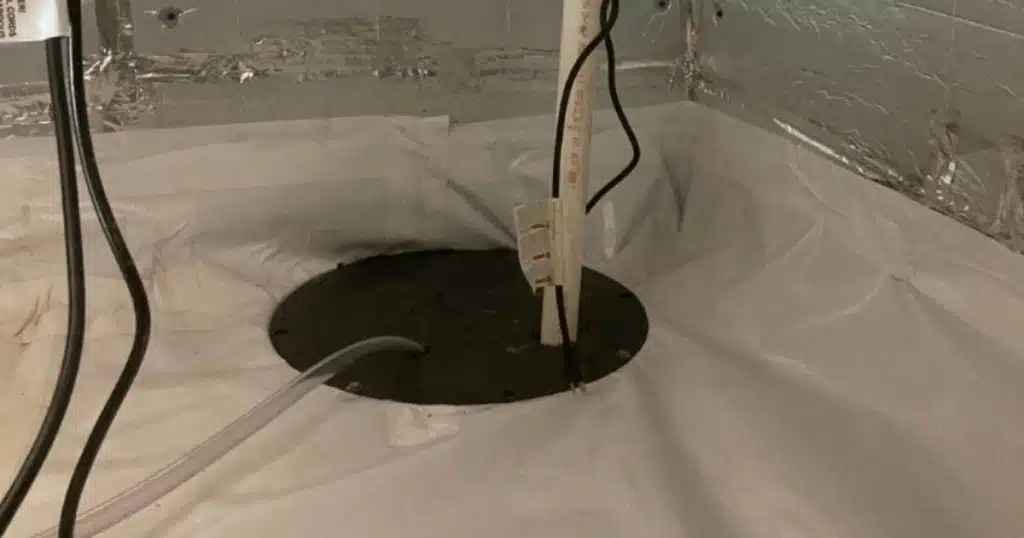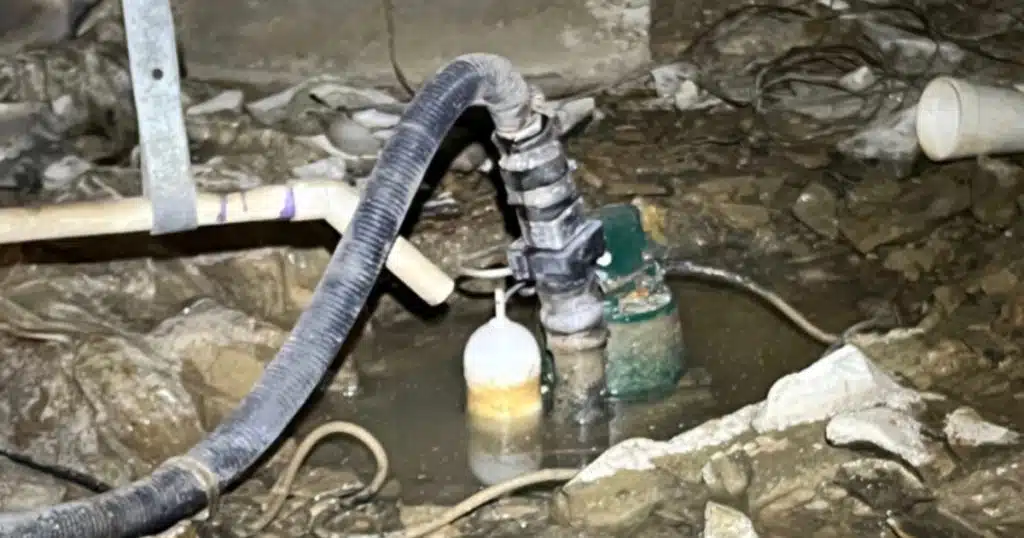
Sump pumps are like the unsung heroes of your homes, quietly working away in the background to keep basements dry and foundations intact. But what if your sump pump system fails? Suddenly, the importance of a functioning pump becomes all too clear as the potential for water damage and the associated headaches loom large.
This comprehensive guide will take you through why sump pump failures occur, their consequences, causes, signs, and how to prevent them. Let’s dive into this topic, ensuring your home stays dry and safe.
Consequences of a sump pump failure
A sump pump system is designed to pump water through a discharge line and divert it away from the foundation of your home. When there’s a sump pump failure, the outcomes can range from inconvenient to catastrophic. Without this critical line of defense, water from heavy rains or melting snow will begin to accumulate at the lowest point in your home. That point may be the foundation, crawlspace, or basement.
Immediate Consequences
- Water starts to collect, and your basement can quickly turn into a mini-pool.
- Items stored in your basement might get damaged, including things you really care about.
- The moisture can attract pests that nobody wants to deal with.
- Electrical systems can get wet, which is dangerous and expensive to fix.
Long-term Consequences
- Moisture stuck around can weaken your home’s foundation, which is super important for keeping everything standing strong.
- Mold and mildew can start growing, which can cause allergies and other health issues.
- Constant water problems can make your home’s value go down, which can affect its resale value..
- The feeling of safety in your own home might start to slip away as water keeps being a sneaky invader.
Knowing these consequences is important so you can understand why these things happen and how to keep them from happening in the first place.
What Are the Common Causes of Sump Pump Failures
Several factors can lead to the sump pump failure, each with its own set of challenges. Understanding why is the first step in preventing future issues. Below, we’ve outlined the most frequent reasons for sump pumps not working.
- Power Loss
Sump pumps need electricity to work. If the power goes out, so does the pump’s ability to protect your basement. Sometimes, the problem is as simple as a plug getting loose or a circuit breaker tripping. Power surges can also harm the pump, making it stop working when you need it most. This is why we recommend installing a battery backup to make sure your home stays dry even during power outages. - Age and Wear
Sump pumps, like any mechanical device, have a limited lifespan, usually, they last around 10 years. Age can cause components to wear out and fail. If this much time has passed since you purchased your sump pump, it could be the right moment to consider getting a replacement. - Faulty Installation
Improper installation of a sump pump can also result in malfunctions. For instance, if the discharge line isn’t correctly angled, it might lead to water flowing back into the sump pump, causing it to strain and potentially fail, potentially resulting in the sump pump leaking. - Sump Pump Clogged, and Debris
Sump pumps are designed to handle water, but they can become overwhelmed if there is too much debris or large objects in the sump pit. This can cause blockages and the sump pump clogged with sediment, preventing it from functioning properly. - Lack of Maintenance
Ignoring regular maintenance for your sump pump can also lead to failure. Over time, parts may become worn or damaged, and without proper upkeep, these issues can escalate and result in a complete malfunction. - Overwhelmed Pump Capacity
Sometimes, a sump pump isn’t capable of handling the volume of water it encounters, especially during heavy rainfall or flooding. This could occur due to an incorrectly sized pump, or more water influx than anticipated. - Wrong Size of Sump Pump
Choosing a sump pump that’s too small or too large for your home’s needs can lead to problems. A too-small pump might not handle the volume of water, while a too-large pump can cause rapid on-and-off cycling, wearing it out prematurely.
Sump Pump Failure Symptoms

Identifying the early signs of your sump pump not working is crucial in preventing water damage to your home. Recognizing these signs can save you both time and money by allowing you to address any problems promptly.
- Strange Noises: Any out-of-the-ordinary noises, like clanging or grinding, could signify a problem.
- Frequent Cycling: If your pump seems to turn on and off more frequently than usual, it could mean there’s a problem.
- No Water Discharge: If the pump is running, but no water is being discharged, it may be that the impeller is damaged or clogged.
- Mold and Mildew Presence: The presence of mold or mildew around the sump pump or in the basement can be a sign that it is not adequately removing water, creating a damp environment conducive to mold growth.
Prevention Tips to Avoid Sump Pump Failure
To prevent your sump pump from failing, there are several essential steps to take. First, regularly check the intake screen and clean it when necessary. Ensure that the sump pump is correctly sized for your home’s needs to avoid overwhelm.
Additionally, having a backup power source, such as a battery backup sump pump or generator, ensures continued operation during power outages. It’s crucial to have the pump installed by a professional for optimal performance.
Consider adding a water alarm to your sump pit for early warnings of rising water levels. Lastly, conduct regular maintenance, including cleaning the pump and checking its operation, to keep it in top condition. These proactive measures significantly reduce the risk of sump pump failure, safeguarding your home from potential water damage.
What to Do if Sump Pump Fails?
When your sump pump fails, it’s likely during a rainstorm. The water seeps in through the foundation or basement walls, pooling at the lowest point in your home. Here are a few things that you can do.
Safety First:
- Turn Off Electricity: If safe to do so, turn off the power in the area to prevent electrical shock.
- Wear Protective Gear: If you’re entering a flooded area, wear rubber boots and gloves.
Act Quickly:
- Water Extraction — It’s important to remove as much of the standing water as you can. Use a wet vacuum or water pump, both of which should do the trick.
- Water Damage Restoration — Despite your best efforts, you won’t be able to remove all of the standing water. For that, you need to call a local water damage restoration company. They’ll bring in advanced restoration equipment and use a thorough process to help.
- Document the Damage — For insurance purposes, be sure to take clear photos and meticulously document the full extent of the damage.
- Repairs or Replacement — Lastly, you’ll want to get the sump pump back up and running. You’ll need a replacement or repairs from trusted basement waterproofing professionals right away.
Need Help With Your Sump Pump Failure? Contact LUX Today!
Dealing with sump pump issues can be stressful, but you don’t have to face it alone. Our team of experienced professionals at LUX Foundation Solutions is here to help, offering expert advice and top-notch repair services to make sure it is ready to protect your home from water damage. Our team knows all about getting it to work right and keeping it that way.
Ready to protect your home from sump pump failures? If you have any inquiries about or require assistance in choosing the right one for your home, don’t hesitate to Contact us for a free estimate. We are your trusted sump pump repair specialists, offering comprehensive sump pump installation services in Northern Virginia, Shenandoah Valley, North Central Virginia, West Virginia, and surrounding areas. Your home’s safety is our priority!
Sump Pump Failure FAQ’s
How to tell if a sump pump is clogged?
Several indicators can suggest that your sump pump is clogged.
– Unusual sounds, such as whirring noises or grinding, coming from the pump during operation.
– If water fails to discharge properly or if the pump runs continuously without effectively removing water from the sump pit, it may be a sign of a clog.
Regular maintenance, including periodic cleaning of the pump and inlet screen, can help prevent clogs and ensure proper functioning. If you suspect a clog or encounter any issues with your sump pump, it’s advisable to contact professionals like LUX Foundation Solutions for inspection and necessary repairs.
How long does a sump pump last?
Its longevity varies depending on several factors such as usage, the installation process used, and the quality of the materials used. Sump pumps typically last anywhere from 5 to 15 years.
Consistent upkeep, such as cleaning the pump and monitoring for wear indications, can extend its lifespan. However, it’s essential to monitor its performance and be prepared to replace it if it shows signs of malfunction or deterioration. For expert advice on sump pump maintenance and replacement, consult our professionals at LUX.
Can I install a sump pump myself?
While it’s possible to install it yourself, it’s generally advisable to seek professional assistance. Proper installation is crucial for the pump’s effectiveness and longevity, as well as for ensuring compliance with building codes.
Professional installers at LUX Foundation Solutions have the expertise and equipment to install sump pumps correctly, minimizing the risk of errors and future issues.
How often should I check my sump pump for issues?
It’s advisable to inspect your sump pump for issues at least once every three to four months. Regular inspections help verify that the pump is operating properly and allow for the early detection of any potential problems. Additionally, it’s crucial to perform checks before and after the rainy season or periods of heavy rainfall to ensure the pump is prepared to handle increased water flow.
If you notice any signs of malfunction or irregularities during routine checks, it’s essential to address them promptly to prevent potential water damage. For professional assistance with sump pump maintenance or repairs, contact experts like LUX Foundation Solutions.
What should I do if my sump pump starts making strange noises?
If your sump pump starts producing unusual noises, it’s crucial to act promptly to prevent potential malfunctions. Begin by turning off the pump to avoid exacerbating the issue. Then, visually examine the pump and its surroundings for any apparent signs of damage or blockage.
If you’re unable to identify the cause of the noise, or if there are signs of damage, contact LUX experts for inspection and necessary repairs. Ignoring strange noises can lead to pump failure and potential water damage, so it’s essential to address them promptly.
